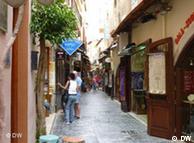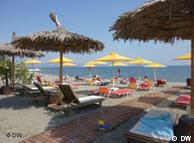TOURISM | 21.06.2011
Doomsday economic projections hit Greek tourism sector
As headlines and doomsday stories about the Greek economy permeate the news, the image of the country as a tourist's paradise is being tarnished. While most of the strikes and protests have been confined to cities like Athens, even areas untouched by the chaos of the capital are hit by the crisis.
Every year a million tourists fly to Crete, the Hellenic Republic's largest island. But this year's outlook is not as optimistic, according to Irini, owner of the four-star hotel Irini Mare, in the small fishing village of Agia Galini on the southern coast.
 Irini said she worries about not being able to keep her 35 employeesHoteliers like Irini know only at the last minute if they'll have a full house or not - and in the heat of the economic crisis, that's even more difficult to calculate. She has 35 employees, but with only a third of the hotel rooms occupied, they're more of a burden on her profits than a necessity.
Irini said she worries about not being able to keep her 35 employeesHoteliers like Irini know only at the last minute if they'll have a full house or not - and in the heat of the economic crisis, that's even more difficult to calculate. She has 35 employees, but with only a third of the hotel rooms occupied, they're more of a burden on her profits than a necessity."I really worry, I don't sleep at night - that's no joke," she said. "I feel responsible for my employees. I can't leave them without work until July, and then all of a sudden say I need them for two months."
No seasonal work
Plenty of other hotel owners do just that. Irini is constantly getting phone calls from people looking for seasonal work - and not just the usual crowd of Albanians, Bulgarians or Turks. More and more, Greeks from the mainland, where unemployment is 16 percent, are the ones asking for jobs.
Far from being able to hire new employees, Irini said she's fighting rising costs. The government is raising value added tax from 19 to 23 percent, under pressure from lenders to increase revenue. And if the current trend continues, Irini said her situation will become critical.
 Local produce is cheap, but imported products are extremely expensive"We won't have any more foreign products," she said. "Our meat comes from Germany. Two years ago, I paid 20 percent upfront. Now the delivery company says they can't do that any more. We have to pay the full amount when we place the order."
Local produce is cheap, but imported products are extremely expensive"We won't have any more foreign products," she said. "Our meat comes from Germany. Two years ago, I paid 20 percent upfront. Now the delivery company says they can't do that any more. We have to pay the full amount when we place the order."This is a problem for Irini and many other Greek business owners, who often need their supplies in advance, but don't have the cash to pay right away. Credit is nearly impossible to get, so Irini has no choice but to save - not just in her business but in her private life as well.
Soaring prices
Crete's relative isolation from the rest of Greece makes imported goods extremely expensive, especially with rising transportation costs.
"Sausage and cheese are sinfully expensive," said Franz, a tourist from the Bavarian town of Erlangen visiting Crete with his wife, Karin. "Everything they produce themselves is cheap, but what they have to import is expensive. Butter costs three euros and 45 cents."
A liter of gas on the island costs 1.88 euros, or about $10.80 per gallon. Franz and Karin said they wonder how average Greeks can get by at those prices, as typical job in the tourist industry pays 1,000 euros per month.
Still, Karin said she and her husband haven't noticed any kind of crisis.
 Roughly one million tourists travel to Crete every year"We have the impression that the Greeks here are doing quite well, and that they can get hold of everything they need," she said.
Roughly one million tourists travel to Crete every year"We have the impression that the Greeks here are doing quite well, and that they can get hold of everything they need," she said.Taboo topic
But Kaliroy, a Greek-German medical student from Munich who works at a clinic in the island's capital Heraklion, said Franz and Karin are mistaken. Only among the well-employed, like her hospital coworkers, is the crisis a taboo.
"We've spoken with many outside the hospital, and with them you can talk openly about the crisis," Kaliroy said. "They say their future is uncertain, that they're unsettled by it. And above all they're worried about their children. You never get the feeling that the crisis is a taboo topic among Greeks."
Kaliroy said the fact that she's half-Greek, and that her father recently lost his job, means she ends up talking about the crisis with Greeks far more than the tourists just spending a short time on the island.
"My dad worked 20 years for Siemens in Germany and in Athens in a managerial position," she said. "On a Thursday he got his letter of termination, and by Monday he had to clean out his desk."
Back in the Hotel Irini Mare, Irini said she also worries about the Greece her children will inherit. With fewer and fewer job opportunities, many well-educated Greeks are leaving the country, which Irini said would lead to a brain drain.
Irini's son is finishing his degree in tourism in Heraklion, and she hopes he'll stay in Greece. But her daughter, who studies economics in Athens, sees less opportunity for herself.
"Now she's saying, 'Yeah, I'm not going to stay here, I'm thinking about going to the United States,'" Irini said. "That's crazy, and that's what saddens me the most. It's really a shame because Greece is a rich country. But we've had such awful governments. From the first to the last, they've all been garbage."
Author: Miriam Klaussner / acb
Editor: Susan Houlton
Editor: Susan Houlton
dw



Για δες που μας έφερε το κακό μας το μυαλό.Η νοοτροπία και η ροή της βοήθειας για μοντέρνες υποδομές εκσυχρονισμού,οδηγήθηκε σε κάρα,σπίτια και πισίνες με αποτελεσμα η χώρα να μη αντέχει τον ανταγωνισμό.Κοντός ψαλμός αλληλουια./ οι χρυσές εποχές παρήλθαν και μεις τις χάσαμε/
ReplyDelete